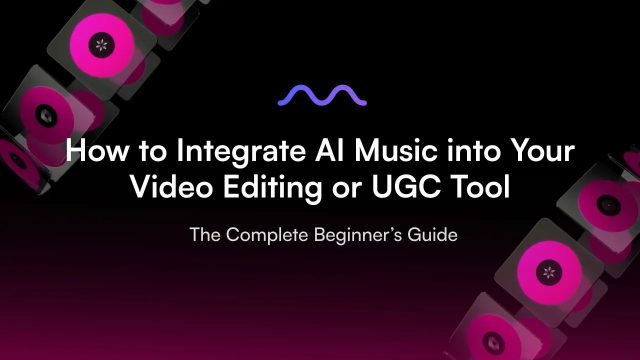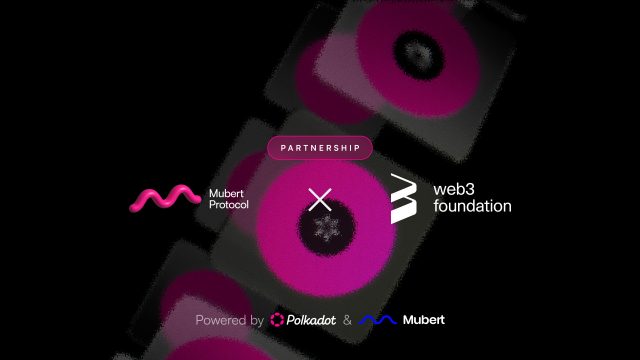Artificial Intelligence is becoming big news in the music business, a fact which was recently amplified by TikTok owner Bytedance acquiring UK-based AI Music company, JukeDeck.
Like Jukedeck, Mubert is a player in the AI music space which has also raised significant investment (circa $1m) – in Mubert’s case, from the likes of GVA Capital (USA), IT-Farm (Japan), FunCubator (Russian Federation) and more.
The platform creates what it calls “real-time generative music” based on existing samples in its database. Its AI, therefore ‘generates’ brand new music every day, with each track designed to suit a specific individual’s mood or activity.
Mubert broadly has three dimensions to its operation: subscription-based music streaming offering for consumers (Mubert Play); a royalty-free licensing offering for businesses and events (Mubert Business); and its industry-facing tier (Mubert Pro), which enables artists and rightsholders to upload samples and get paid for their use.
The firm recently collaborated with Adidas to deliver the sports company’s customers a ‘channel’ in which they could access personalized music.
Mubert was developed in Russia and has already enjoyed serious success in Asia: the company claims that it is well-established in Japan, China and India, with over 200 million users in these three regions alone. Last month, Mubert launched in the United States.
Here, Mubert founder and CEO Alexey Kochetkov (pictured) argues why he believes AI is about to usher in an exciting new future for artists, and for those seeking to license their music…
“Science and art are the two eyes of human culture. And the very difference between them and their equality make the volume of our knowledge. Art is a form of thinking that makes a human being as it is.” — Yury Lotman On the Nature of Art, 1990
Art is nothing less than another way of conceiving the world. People master and operate sign systems such as language, maths, painting, and music. Music, specifically, accompanies a human being from the cradle to the grave – a soundtrack that begins with a mother’s first song and is added to over time by composers, performers, and bands.
Artificial intelligence is now moving beyond technical and mundane tasks and entering the world of art. Big questions concerning the nature of talent, genius and inspiration still remain unanswered – and the same applies to the dispute of what makes music human.
While we witness AI penetrating the art of composing, writing songs, and signing contracts with labels, its role remains undefined. Is civilization being challenged here, or provided with a handy tool? Will AI replace or supplement artistry?
Human nature is dual: people create as expertly as they destroy. What if AI could fill the gaps where people are prone to wrong turns?
The music industry as we know it
Historically, the music industry has relied on royalties as a major form of payment. This is a complex subject: different types of royalties require different contracts, which in turn define specific kinds of usage and licensing of intellectual property.
With the advent of the digital era and the rise of streaming services, royalty relationships have become even tenser. Both streaming services and artists are unhappy for the same, simple reason – they are not making enough money. In fact, Spotify has had a serious profitability problem; it has been a loss-making business from day one, despite growing to around 200 million users today.
It is the same old ‘winner-takes-all’ situation, where industry moguls make millions, while new and perspective artists struggle.Alexey Kochetkov, CEO Mubert
For a tech entity, Spotify has unusually high marginal costs – predominantly thanks to the content charges it has to pay record labels. At the same time, Spotify is ranked among the lowest-paying music platforms per stream. Sad but true: a median musician in the USA today earns less than $25,000 a year (Rolling Stone); if he or she is not Post Malone or Cardi B, their chances of making a living are negligible.
The digital era has changed the way people interact with music: the path from the composer, through the performer, to the listener’s ear has been altered. Yet this content democratization has not made it easier for emerging musicians: it is the same old ‘winner-takes-all’ situation, where industry moguls make millions, while new and perspective artists struggle.
AI as the ground of the new ecosystem
Artificial intelligence can lend a helping hand in forming a new music industry culture – both qualitatively and quantitatively.
With this idea in mind, we created Mubert, an AI-powered service of generative music that provides an entire infrastructure for the music industry where all stakeholders can benefit. With our tools, artists can create and monetize their samples and patterns, labels can share royalties with their artists, and sample distributors are given a new business model for their sample database.
In the eyes of our users, Mubert is a real-time streaming service allowing people to play completely unique, endless music streams based on personal preferences, actions, events, and moods. Traditionally, it took a lot of effort to tweak music to personal needs — requiring constant management of playlists, for example. An AI-based algorithm can instead play the part of a conductor, handpicking samples and weaving a never-ending personal soundtrack – a musical canvas which perfectly suits a specific listener at a specific point in time.
An AI-based algorithm can instead play the part of a conductor, handpicking samples and weaving a never-ending personal soundtrack.Alexey Kochetkov, CEO Mubert
From a business standpoint, Mubert is a long-anticipated solution for broadcasting copyright-free music streams. Businesses across various industries have traditionally had to acquire permission from copyright owners to play music legally.
Event organizers, for instance, use music to create a certain atmosphere and mood. Their requirements can be a perfect example of how ‘functional’ music works; when an emotional constituent is not required – just a light, unobtrusive audio background. For this purpose, Artificial Intelligence is a suitable approach: event organizers can choose activity and mood, then play music streams simultaneously or schedule playback for later.
All in all, AI is a game-changer due to one very important thing: from now on, music can adapt perfectly to a listener; listeners no longer have to adapt to the music.
Final thoughts
Music is just another language of communication, and the adoption of new rules forms the basis of the new culture. As long as there is no compromise for AI, the music industry can become a transparent environment where all stakeholders receive equal chances of self-expression and fair conditions for monetization.
The human touch remains where music is at its best — taking notes and making them into a piece of art. Music without a listener is non-existent: Mozart’s record without an ear is just a physical object.
A listener is a co-creator, and artificial intelligence offers them a new tier of involvement in the enigmatic world of composing.
AI API B2B Collaborations PublicationsAI Music Company
Mubert is a platform powered by music producers that helps creators and brands generate unlimited royalty-free music with the help of AI. Our mission is to empower and protect the creators. Our purpose is to democratize the Creator Economy.
Generate Track API for Developers
















